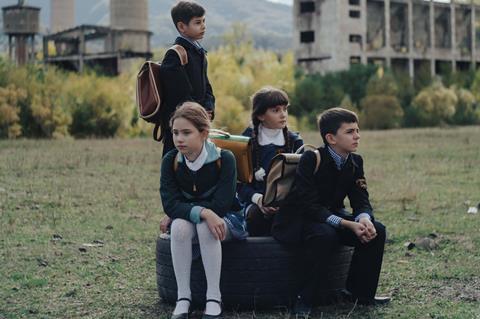Mihai Mincan’s beguiling sophomore feature premieres in Venice Horizons

Dir/scr. Mihai Mincan. Romania/ France/Denmark/Greece/Bulgaria 2025. 104mins
Elusive, troubling and densely-crafted both visually and sonically, Milk Teeth is not quite like any film we have yet seen from contemporary Romanian cinema. The second fiction feature from Mihai Mincan following 2022’s sea-going drama To the North, it combines the everyday realism associated with Romania’s New Wave cinema with an imagistic, sometimes hallucinatory style evoking the intensity of childhood perception. It’s also a depiction of a very specific moment – the time immediately prior to the fall of the Ceausescu regime, its young heroine representing Romania’s so-called ‘lost generation’ of children.
Not quite like any film we have yet seen from contemporary Romanian cinema
This Venice Horizons title shares the occasionally confounding visual grammar associated with, say, Lucrecia Martel or Georgia’s Dea Kulumbegashvili, and a sometimes militant preference for indirection that, at times, makes it as frustrating as it is impressive. Prospects will be niche, but it will certainly mark Mincan as a director willing to take formidable artistic risks.
He is also an impressive director of child actors – although what’s so striking about young lead Emma Ioana Mogoș is how consistently and believably impassive she is, her traumatically detached protagonist very much an opaque observing presence. She plays Maria, a 10-year-old girl living on an estate in a provincial Romanian town in the late 80s. The film begins in April 1989, with Maria out playing with friends. Her older sister Alina is due to join them, as soon as she has taken a bucket full of walnut shells – from her mother’s baking – to the nearby dumpster. She never returns, and police are called in to investigate her absence; in charge of the case is a lugubrious, apparently unempathetic officer (István Téglás), whose smoothly sotto vocal delivery makes him seem more a harbinger of doom than a possible help.
Maria and her young friends start playing detective, and explore a vast empty industrial hangar. What they see, or seem to see, in its basement introduces something of a generic horror flavour, although this appears to be the product of the fertile childhood imagination – a theme later pursued when an ominous hallucinatory figure looms faintly out of the darkness of a child’s bedroom. There’s an even more nightmarish climactic sequence, cloaked in deep red chiaroscuro, although here the film arguably takes a step too far off the relatively stable imaginative landscape it has hitherto marked out.
While Alina’s absence is profoundly distressing for parents Cezaria (Marina Palii) and Petre (Igor Babiac), it becomes simply a given of Maria’s daily life. Resilient and seemingly numbed as she appears, Alina nevertheless becomes increasingly isolated in her small world, holding on to a single walnut as a protective talisman. Late in the film, she finds a new sort of belonging when she is old enough to take the oath of loyalty to the Socialist Republic and join the Pioneers youth group. It’s a strikingly ironic moment, as she is pledging herself to an order that is about to end explosively – although it is typical of the film’s elliptical approach that the revolution of 1989 is never depicted, only alluded to retrospectively in the coda.
Milk Teeth eschews direct connections in favour of a jigsaw approach, with editor Dragos Apetri keeping us anxiously alert throughout – as in the early scene in which Alina’s parents search frantically by a canal at night before we even know that she is missing; or a later sequence in which we hear Maria hailed by a voice off-screen, before we suddenly find her with a new playmate (whose toy-filled bedroom and access to cakes and chocolate suggest the privileged daughter of party officials).
Whether offering panoramic views of the stark estate, or musing in close-up over single objects, George Chiper-Lillemark’s photography suggests a world cloaked in a faint haze of memory. Nicolas Becker’s unsettlingly textured sound design – from unexplained rustling and scratches to the distant, echoing sound of a Pet Shop Boys song – enhances the feeling of a half-recalled dream through which Maria seems to float unanchored.
Production company: deFilm
International sales: Cercamon, hello@cercamon.biz
Producers: Radu Stancu, Ioana Lascar
Cinematography: George Chiper-Lillemark
Production design: Anamaria Țecu
Editor: Dragos Apetri
Music: Marius Leftărache, Nicolas Becker
Main cast: Emma Ioana Mogoș, Marina Palii, Igor Babiac, István Téglás
























